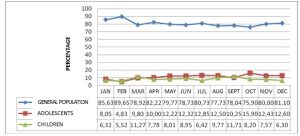
ABSTRACT
Background
In Brazil, the services offered to children and adolescents are still in the mold of the adult population, not contemplating the specificities of this public.
Objectives
To characterize the admissions of children and adolescents in a Psychosocial Care Center II in the north of Ceará, Brazil.
Materials and Methods
A quantitative descriptive study was conducted with secondary and primary data. The convenience sample comprised 1,942 admissions of children/ adolescents to the psychosocial center. The data were extracted from the attendance record and comprised the following variables: year/month of the visit, age, location of residence, diagnostic hypothesis, and medical record status.
Results
The highest number of children’s visits (35.64%) occurred in 2018. In 2019, teenagers accounted for most of the visits (33.50%). Most children and adolescents lived in the urban area (79.38% and 77.40%, respectively). The most frequent diagnostic hypotheses were hyperkinetic disorders (19.48%) among children and depression (20.51%) among adolescents.
Conclusion
The psychosocial services provided in the center are aimed at children, teenagers, and adults. It is urgent to offer adequate service to children and adolescents who attend the service.
